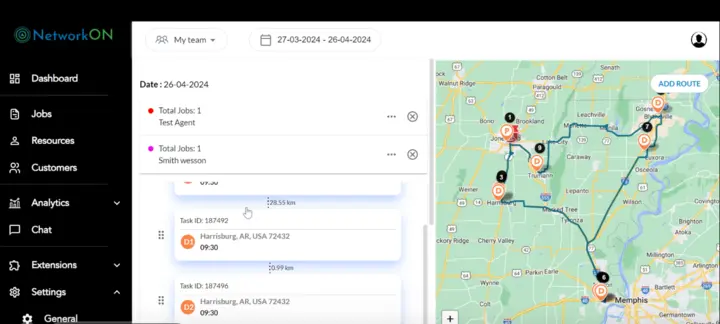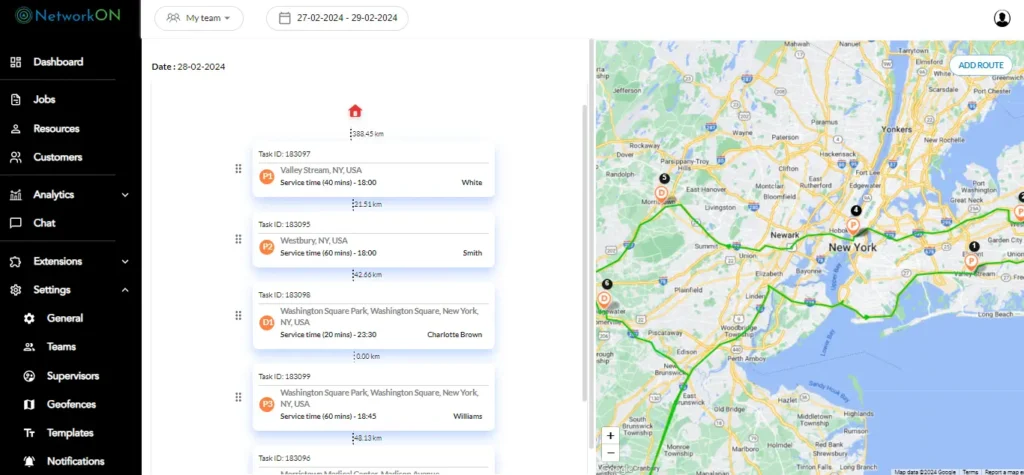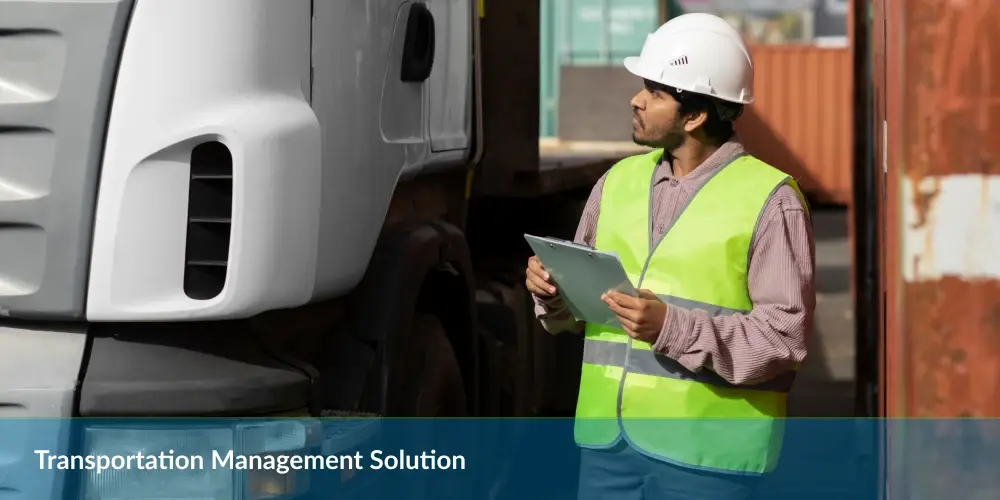Table of Contents
Carrier companies recognize fleet optimization as a cornerstone of operational excellence. Incorporating a Transportation Management Solution (TMS) into fleet management is an upgrade and a transformation. State-of-the-art TMS platforms utilize advanced algorithms to refine vehicle maintenance schedules, ensuring every asset operates at peak efficiency.

These systems provide a transparent view of fleet performance with real-time tracking capabilities, allowing for swift and informed decision-making. Leveraging TMS’s strengths leads to more efficient fleet utilization and a streamlined cost structure, offering carrier companies a competitive edge in a dynamic market.
Route Planning and Optimization – Navigating Success
A Transportation Management Solution (TMS) transforms strategic route planning within logistics. By leveraging advanced algorithms, a TMS outlines the most efficient paths for cargo delivery. Dynamic optimization tools that respond to real-time traffic data, weather, and vehicle availability are integral to creating cost-effective routing strategies. These tools ensure fleet operators select the optimal routes, avoiding unnecessary detours and delays.

Dynamic optimization tools plot waypoints and predict and address potential disruptions. Successful cargo shipment routes consider delivery windows, driver hours, and load capacities. A sophisticated TMS will account for these complexities, allowing for efficient adjustments even when unforeseen events occur.
Significant reductions in fuel usage stem from optimized routing. When routes are streamlined, trucks travel fewer miles, leading to lower fuel costs and reduced emissions. This efficiency naturally transitions to an increase in on-time deliveries. Customers receive their shipments faster, enhancing the overall satisfaction and reliability of the service provided.
Real-time Tracking and Visibility – The Window to Logistics Excellence
Delivering raw materials or products to customers involves numerous, often complex, stages. Transport Management Solutions (TMS) allow companies to streamline these stages. A key element in this streamlining process is real-time tracking and visibility, which provides a clear view of each shipment’s transit journey.

Enhanced Cargo Shipment Processes with TMS
Businesses integrate TMS into logistics operations to transform cargo shipment into a transparent process. As these systems provide live data, the transportation landscape sees a significant boost in efficiency. Stakeholders harness this data to make informed decisions, adjust to changes on the fly, and optimize the shipping process.
Real-time Tracking Functionalities and Advantages for Carriers
- Real-time tracking systems enable carriers to monitor vehicles and cargo status constantly.
- When unexpected events occur, carriers adjust routes efficiently, minimizing downtime and service interruptions.
- GPS technology, combined with advanced software algorithms, affords precise location data, enhancing the security of assets and shipments.
The functionalities of TMS represent more than mere tracking; they are beacons of operational advancement that guide carriers toward logistical excellence.
Instant Updates for Better Customer Service
Customers expect swift and transparent service. The availability of instant updates through a TMS satisfies this expectation. When customers inquire about their shipment, they receive accurate location and estimated time of arrival details. This interactive approach to customer service fosters trust and loyalty, benefiting businesses in the long term.
Minimizing Delays with Proactive Alerts and Notifications
Proactive measures supersede reactive ones. TMS exemplifies this by providing alerts and notifications for potential delays or mechanical issues. Carriers then take immediate preventive or corrective action. By anticipating problems before they manifest, businesses mitigate risk and maintain their promise of timely delivery.
Regulatory Compliance – Navigating the Legal Landscape
Transportation management solutions provide automated tools that ensure compliance with complex regulatory requirements. These systems meticulously monitor and manage necessary documentation, driver qualifications, vehicle standards, and hours-of-service records to maintain adherence to legal statutes.
TMS and its Automated Solutions for Staying Compliant
With a Transportation Management System (TMS), businesses seamlessly update compliance protocols as regulations change. Detailed record-keeping becomes less burdensome because the TMS automates and archives essential data, which can be quickly retrieved during audits or inspections.
Streamlining Processes for Adherence to Transportation Laws
Effective streamlining of compliance processes involves setting up a TMS to autocorrect and alert for potential violations. Whether dealing with interstate commerce regulations or international shipping laws, a TMS acts as a regulatory watchdog, keeping operations within legal boundaries.
ELD Mandate and Hours-of-Service (HOS) Compliance
The Electronic Logging Device (ELD) mandate revolutionized driver hours recording. A standard TMS integrates ELDs to capture drive time, automatically ensuring hours-of-service compliance. This real-time tracking prevents violations and enhances road safety.
Environmental and Safety Regulations
Transportation must follow operational regulations and environmental and safety standards. TMS platforms manage emissions tracking and safety performance history, thus supporting a company’s commitment to protecting the environment and maintaining high safety records.
Load Planning and Execution – Maximizing Cargo Efficiency
Transportation Management Solutions (TMS) are pivotal in shaping the efficiency of load planning. With advanced TMS software, organizations can orchestrate complex loading scenarios, capitalizing on algorithms to fully utilize available space and reduce shipping costs. These solutions consider multiple variables such as cargo dimensions, weight distribution, and destination to ensure a balanced and secure load.
Innovations within TMS technology have continuously evolved, presenting features beyond mere space optimization. Today’s systems also focus on service optimization, incorporating tools that assess the timeliness and effectiveness of cargo movement within and between facilities. By analyzing vast logistical data, these innovations can predict the best loading patterns and sequences to streamline operations and enhance service delivery.
Determining the optimal transportation mode for different cargo types is a critical strategic move. TMS allows for the alignment of freight characteristics with various transportation modes, such as truck, rail, air, or sea, based on cost, speed, and product-specific requirements. This results in tailored transportation strategies that meet service level expectations and contribute to overall cost efficiency.
Load sequencing is another area where TMS yields significant operational improvements. When cargo is loaded in a sequence that mirrors the delivery route, it facilitates quicker unloading, reduces handling, and minimizes the potential for damage. Load execution thus becomes a smooth process, directly enhancing customer satisfaction through improved service quality and reliability.
Transportation Cost Reduction – Cutting Expenditure through Technology
Transportation Management Solutions (TMS) are significant drivers in slashing logistics-related expenses. By leveraging advanced technologies, companies streamline operations and reduce unnecessary financial outlay. A comprehensive TMS automates processes and provides crucial insights for strategic decisions, favorably impacting the bottom line.
Role of TMS in Reducing Logistics-Related Expenses
Effective TMS implementation facilitates cost containment across various facets of transportation. It includes automating manual processes, enhancing invoice accuracy, and improving the utilization of transportation assets. Real-time data furnished by TMS enables businesses to make informed decisions, leading to cost efficiency.
Strategies for Cost Reduction within TMS
Integrating a TMS within daily operations involves numerous strategies for curbing expenses. Consolidating shipments to maximize load capacity, selecting the most cost-effective mode of transport, and optimizing routes are among the strategies that TMS efficiently executes through algorithms and analytics.
Optimizing Carrier Selection and Negotiating Better Rates
With a TMS, selecting carriers transforms into a data-driven exercise. Companies can compare rates, service quality, and delivery times, ensuring the best match for their shipping needs is found at the most competitive prices. Further, historical data and reporting capabilities allow for robust negotiation positions when determining contract terms with carriers.
- Addresses carrier performance, leveraging data to secure improved service levels and pricing.
- Facilitates side-by-side carrier comparisons, encouraging competitive rates.
- Tracks carrier compliance, ensuring adherence to contracted terms and service levels.
Analyzing Cost Patterns and Identifying Savings Opportunities
Profiling cost trends is uncomplicated with a TMS. Detailed reports elucidate every aspect of shipping expenditures, unearthing patterns that could indicate unnecessary spending. Recognizing such patterns is the preamble to strategizing on actionable changes, like altering distribution networks or shifting to more cost-effective service levels.
Detailed analytics can further pinpoint discrepancies in billing, redundant fees, or accessorial charges that inflate costs. Using this information, companies can take corrective action to strengthen the financial health of their transportation strategies.
Carrier Collaboration and Communication – Synergy in Motion
Effective communication between shippers and carriers is the backbone of modern transportation management solutions (TMS). These platforms facilitate a seamless exchange of critical information, leading to more synchronized operations. Moreover, such systems enable carriers to provide timely feedback and updates, significantly enhancing the quality of service delivered.
Transportation management solutions are equipped with collaborative tools designed to streamline carrier interactions. These tools minimize disruptions and delays by allowing for easy document sharing and communication, ultimately fostering a more reliable supply network.
Platforms for information exchange among supply chain partners are integral to a comprehensive TMS. They serve as conduits for data transfer, ensuring that every stakeholder can access up-to-date information essential for making informed decisions and maintaining a competitive edge in a fast-paced market.
Establishing standardized processes is a direct outcome of utilizing a TMS. Standardizing communication and procedural steps across the board significantly reduces the likelihood of errors and misunderstandings. This uniformity is paramount for achieving peak coordination and efficiency among carriers and shippers alike, ensuring that every cog in the supply chain turns in unison.
Transportation Analytics and Reporting – The Power of Data
Tapping into comprehensive datasets generates profound business insights, particularly within logistics services. Transportation Management Solutions (TMS) offer sophisticated analytics capabilities, enabling businesses to dissect, interpret, and utilize data in previously unimaginable ways. Analyses performed with TMS transform raw data into actionable intelligence, encouraging strategic decision-making and operational improvements.
Reporting Features of TMS and Their Impact on Transportation
Advanced reporting features within TMS streamline data analysis, providing a snapshot of transportation ecosystems. Users benefit from real-time and historical data reports, which have a tangible impact on day-to-day operations and long-term planning. Effective use of reporting tools helps pinpoint cost-saving opportunities, enhances performance, and ensures accountability throughout the transportation lifecycle.
Customizable Dashboards for Financial and Performance Metrics
Customizable dashboards are critical in monitoring the financial and performance metrics that matter most to businesses. Managers procure a high-level view of operations with the capability to drill down into specifics. Visual representations of data, such as charts and graphs, aid in comprehending complex information, facilitating more informed management decisions and swift adjustments to market changes or internal disruptions.
Leveraging Historical Data for Informed Decision-Making
- Harnessing historical data allows companies to identify trends and patterns, paving the way for predictive analytics.
- Performance over any given period can be meticulously evaluated, revealing strengths to build upon and weaknesses to be addressed.
- Comparative analysis against historical benchmarks ensures accurate assessments of improvement initiatives or investments.
By drawing from past experiences, businesses use historical data to forecast future needs, align resources more effectively, and tailor customer experiences to meet expectations.
Sustainability in Transportation – Green Logistics for the Future
A Transportation Management Solution (TMS) merges environmental stewardship with logistics, facilitating the industry’s transition to green initiatives. Advanced functionalities within TMS aid companies in implementing eco-friendly transportation methodologies, championing a new era of sustainability.
Tools designed to promote greener logistics are integral components of contemporary TMS systems. Eco-conscious route optimization reduces travel distances and fuel consumption. In contrast, load optimization ensures that each trip is as efficient as possible, limiting the number of trips required.
Analyzing fuel consumption patterns is critical for reducing the environmental impact of transportation. TMS platforms with robust analytics capabilities empower businesses with data-driven insights to improve fuel efficiency and accelerate the move towards alternative fuels and hybrid vehicle technologies.
With a TMS at the helm, companies can enforce responsible carrier practices. TMS programs incentivize and monitor adherence to eco-friendly measures, ensuring environmental accountability becomes part of the logistic network’s DNA. By enforcing these standards, TMS catalyzes a profound shift towards a more sustainable future in transportation logistics.
Integration with Supply Chain Management Systems – A Seamless Ecosystem
A transportation management solution (TMS) can serve as a linchpin within the broader supply chain, bridging gaps between various logistical components. By anchoring TMS at the core, businesses create a unified network that reliably orchestrates movement from end to end.
The Critical Role of TMS in the Broader Supply Chain
TMS becomes the foundation for a robust supply chain infrastructure when positioned effectively. Its strategic role encompasses overseeing many activities, including order processing, inventory management, and service level optimization. This centralization helps facilitate a coherent workflow and strengthens logistical operations.
Advantages of Integrating TMS with Supply Chain Management Systems
The amalgamation of TMS with supply chain management systems yields considerable benefits. This union’s direct outcomes are enhanced efficiency, cost-effectiveness, and improved customer satisfaction. Additionally, such integration allows for superior scalability, adapting effortlessly to the ebb and flow of business demands.
Ensuring Smooth Data Flow Across All Logistical Touchpoints
Data is the lifeblood of logistics, and its smooth flow is non-negotiable. TMS integration ensures that vital information is shared seamlessly between systems, minimizing the risk of data silos and miscommunication. Consequently, this streamlines the decision-making process and fortifies the supply chain against potential disruptions.
Gaining a Holistic View of the Entire Transportation Lifecycle
Through integration, stakeholders gain unparalleled visibility into the transportation lifecycle. TMS provides a comprehensive overview from initial procurement to final delivery, allowing for actionable insights and informed strategic planning. Therefore, businesses are better equipped to anticipate market changes and pivot accordingly.
Key Takeaways
- Incorporating a Transportation Management Solution (TMS) into fleet management transforms vehicle maintenance and efficiency. Advanced algorithms and real-time tracking capabilities ensure optimal vehicle performance and utilization, leading to a streamlined cost structure and competitive advantage.
- TMS platforms revolutionize route planning by leveraging real-time traffic, weather, and vehicle availability data. This dynamic optimization reduces fuel usage, minimizes delays, and enhances on-time deliveries, resulting in higher customer satisfaction and reduced emissions.
- TMS provides real-time tracking of vehicles and shipments, offering transparency and instant updates to customers. This capability allows for proactive route adjustments in case of unexpected events, improving service reliability and customer trust.
- TMS ensures compliance with complex regulatory requirements through automated monitoring and documentation management. This includes adhering to the Electronic Logging Device (ELD) mandate and environmental and safety regulations, minimizing legal risks, and enhancing operational safety.
- Integrating TMS with broader supply chain management systems creates a seamless ecosystem. This integration enhances data flow, operational efficiency, and scalability, providing stakeholders with a comprehensive view of the transportation lifecycle and facilitating informed decision-making.
Conclusion: Realize the Potential of Your Transportation Operations
Advancements in Transportation Management Solutions (TMS) have transformed the logistics landscape, enabling companies to achieve unprecedented efficiency and effectiveness. Adopting these sophisticated systems has refined each facet of transportation management, from fleet optimization to sustainability efforts.
By implementing a TMS, transportation companies and carriers unlock the operational advantages of streamlined route planning, precise real-time tracking, and rigorous regulatory compliance. Each load planned and executed through a TMS maximizes cargo efficiency while actively reducing transportation costs. The collaboration and communication processes become more synergistic, fostering stronger partnerships among carriers.
Transportation analytics and reporting harness the power of data to illuminate opportunities for growth and improvement. Moreover, the integration with supply chain management systems creates a seamless ecosystem that enhances every link in the supply chain.
The epoch of green logistics is here, with TMS playing a crucial role in supporting sustainability initiatives. When companies adopt eco-friendly practices supported by modern technology, the impact on environmental preservation is tangible.
A superior TMS elevates your operation and propels you toward becoming a leader in the competitive transport sector. Embrace the potential of a journey marked by clarity, control, and continuous advancement. The path to a more connected, cost-effective, and conscientious transportation process begins here.
Are you ready to discover how traditional transportation layouts work? Contact NetworkON for a personalized consultation or a demo of a state-of-the-art TMS. Now is the time to embark on the path toward operational superiority.
Reach out today and take the first step in revolutionizing your transportation operations.
Frequently Asked Questions
How does a Transportation Management Solution (TMS) improve fleet optimization?
A TMS uses advanced algorithms to refine vehicle maintenance schedules and optimize fleet performance. By providing real-time tracking capabilities and a transparent view of fleet activities, TMS ensures that each asset operates at peak efficiency, reducing operational costs and enhancing competitive advantage.
What are the benefits of real-time tracking in a TMS?
Real-time tracking in a TMS allows carriers to continuously monitor vehicle and shipment status. It enables quick adjustments to routes in case of unexpected events, minimizes downtime, improves service reliability, and provides accurate updates on shipment locations and estimated arrival times, enhancing customer satisfaction.
How does TMS ensure compliance with regulatory requirements?
TMS automates the monitoring and managing the necessary documentation, driver qualifications, vehicle standards, and hours-of-service records. It stays updated with changing regulations and provides detailed record-keeping for audits and inspections. This ensures compliance with legal statutes, including the Electronic Logging Device (ELD) mandate and various environmental and safety regulations.
What advantages does integrating TMS with supply chain management systems offer?
Integrating TMS with supply chain management systems enhances efficiency, cost-effectiveness, and customer satisfaction by creating a unified network. It ensures smooth data flow across all logistical touchpoints, provides a holistic view of the transportation lifecycle, and enables better resource alignment and informed decision-making, strengthening the supply chain.





0 Conversations